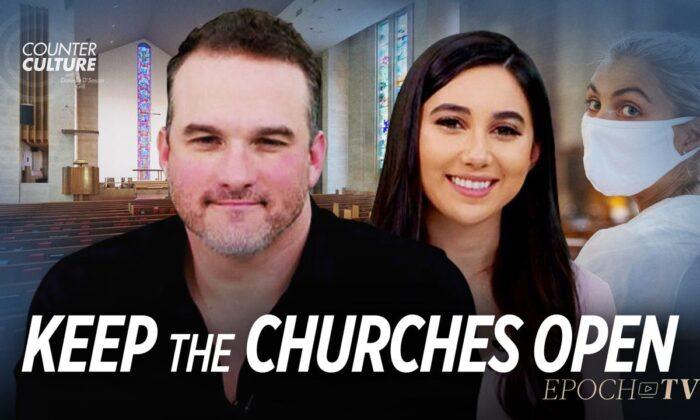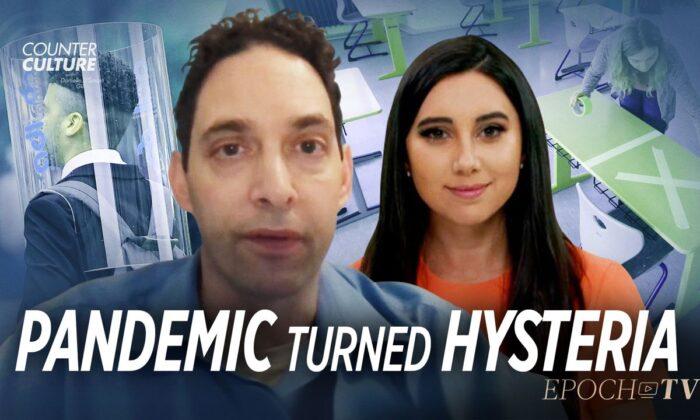If you’re a member of Generation X as I am, you remember a world where “The Dukes of Hazzard” was good, wholesome family entertainment. Everyone loved the General Lee (orange 1969 Dodge Charger), and no one cared about the flag on the roof. You remember watching “Looney Tunes” on Saturday morning and laughing at Pepé Le Pew chasing Fifi as she recoiled from him (no, she was not spurning his advances because they were unwelcome, but because he was a skunk). You learned how to read thanks to Dr. Suess, and you probably watched both “Dumbo” and “Peter Pan” at some point in elementary school right before a week-long holiday break when students didn’t want to learn so teachers didn’t bother trying to teach. You remember having breakfast with Mrs. Butterworth and Aunt Jemima and having dinner with Uncle Ben. And you’re hopefully keeping track of Dave Rubin and what he has to say, as he has a large platform and does his best to speak for the values with which we grew up.
Full disclosure, I’m a bit of a Dave Rubin fangirl. I subscribe to “The Rubin Report” and watch it daily, as he’s one of the few pundits who can still make me laugh about the fact that we’re basically reliving the 1970s, which I was around for but blessedly too young to really remember, especially with all the plaid and polyester. He pronounced the “P” in Jen Psaki’s name for many months, and I can’t explain why I found that hilarious, I just did. He’s fond of responding to clips of Gavin Newsom using f-bombs, which seems an appropriate response to everything the man has done to the state of California, where Rubin now resides. We’re nearly exactly the same age, we both grew up in New York (though different parts of the state), and we share the same classical liberal values—leaning towards the libertarian side of the political spectrum. We share a culture and a common history in terms of what was popular when we were children, and I get every one of his pop culture references from our youth (especially when he waxes nostalgic about eschewing current television to watch reruns of “The Golden Girls”—ah, good times). It took Rubin quite a bit longer to realize the Democrats were not the champion of the little guy that they purported to be than it did for me, but that’s easy to forgive considering how many people they still have snowed.
Rubin is also one of the most straightforward, engaging, persuasive voices for the new populist movement sweeping through the Republican Party without resorting to some of the more brash tactics people like Steven Crowder employ (I’m a fan of his, too). His content is therefore easier to share with anyone that sits in the middle of the aisle or slightly left of center who are even slightly open minded. That is, of course, if you can convince them Rubin is not a rightwing extremist championing fascism as the New York Times likes to purport. Apparently their writers are convinced that he’s not only a self-hating gay man who just happens to be married to another gay man, but a self-hating Jew as well. Ah, all those internalized phobias and isms you’re accused of having if you’re a member of a supposed oppressed demographic and don’t think “the right way.”
That’s one of the topics Rubin and host Joshua Philipp discuss in this “Crossroads” episode, “Dave Rubin: How Half of the Political Dialect Wants to Erase America’s History.” It’s a short episode, only 14 minutes long, and I wonder if it would have been longer if they hadn’t shut off the lights at the convention right before the start of the interview. They open with a discussion of the ways the political party has changed, and how to blend the new populism Trump brought into the Republican Party with factions of the party that fall under the more traditional banner, such as conservatives and neocons. Donald Trump’s ascendency exposed just how many establishment Republicans are more interested in maintaining their power than responding to the will of the people, like Mitt Romney who will roll over on command, apparently as eager as the family dog that used to ride on the roof of his car for a biscuit and a “good boy.” In doing so, he opened the party to new blood at a time when the GOP was in danger of forever being thought of as only there for old, rich, white men. It’s ironic, and endlessly upsetting to the left, that it was an old, rich, white man who was so able to shake things up.
Trump’s idea of putting America first, that the U.S. government should (gasp) care about the needs of the American people first and foremost, has broadened the GOP tent, opening it to disaffected classical liberals who have no home in the Democratic Party anymore, and independents who may be waking up to politics for the first time thanks to the insanity of “wokeism.” Rubin argues this bigger tent is necessary, and that individual differences between those with a more libertarian bent versus traditional conservatism don’t really matter at this point because the other side of the political spectrum no longer believes in the Constitution, the rule of law, or that the founding of America was fundamentally good, despite its imperfections. Many on the modern left may like to call themselves “liberals,” but that’s likely just because they’ve realized how insane progressives are and want to fly under the radar with voters. There is nothing classically liberal about the way the left views free speech, freedom of expression, the right to privacy, or upholding the Bill of Rights.
So Rubin calls himself a conservative, not necessarily in the traditional sense of the word, but with a desire to conserve the values liberals used to care about back in the 1960s. That’s good enough for me. The history of this country, warts and all, the freedoms enshrined in the Constitution, individual rights and liberties, the rule of law—these are all worth conserving. The Republican Party should look into rebranding with a Rubin-esque message (not to be confused with Rubenesque), given the way the mainstream media continues to insist that conservatism somehow equals white supremacy. They’d do very well, I suspect.
Rubin and Philipp touch on the history of American political parties as well, talking about how different the current shifts today are from those in the past. While parties like the Federalists, Democratic-Republicans, and Whigs have long since gone the way of the dodo, none of them wanted to burn our entire system of government to the ground the way the modern left does. This pushes independents, conservatives, libertarians, and evangelicals into the same camp, one where they might not necessarily share all the same values but recognize what the other side represents. To be clear, the “other side” currently represents Marxism, communism, socialism, and slicing and dicing the population into smaller and smaller subsets on the oppression pyramid so it’s easier for the government to have complete control over every aspect of our lives. A country divided against itself cannot stand, something the left has taken on as a guiding principle rather than a dire warning.
Rubin rightly points out that the Republican Party (the people, not necessarily elected officials) are much more welcoming to those with differing views and lifestyles than anyone currently in positions of power on the left. Whereas people on the right may disagree on various policy issues (Rubin mentions his begrudging stance on abortion), they’re still open not only to conversation, but to divergent opinions. On the left you have the choice of marching in lockstep and changing your views and opinions on a whim based on the current trends or being canceled and shunned by everyone who used to call you a friend.
To Rubin, the difference between the two options facing the nation is very straightforward. One party wants to destroy everything that has made this country exceptional and unique to replace it with Bernie Sanders-style socialism, where imperfect people somehow manage to construct a perfect system of government that will oversee every aspect of a person’s life and meet their every need without devolving into chaos, misery, and death. The other party recognizes that the tired refrain of, “Communism just hasn’t been implemented properly” or “That wasn’t real socialism” is a pile of something that came out of the back end of a horse, and wants to preserve the system we have. We may not be perfect, but we’re not Venezuela, and Rubin states unequivocally that, for him and for a growing number of Americans, the choice between the parties couldn’t be more clear.
Philipp and Rubin close out the interview talking about the various factions pulling on the two main parties and how each one is responding. While the Democrats can be seen capitulating to their most extreme, least welcoming progressive wing of the party, Republicans have been pulled towards a more populist message in the wake of Trump. It is clear, despite how much Never Trumpers hate it, that the former president still holds tremendous sway with the base, often far more than traditional Republicans, though it is not because people on the right are in some kind of cult.
Trump represents the idea of standing up to the establishment, of fighting back, and of putting Americans’ needs ahead of others. The left finds this cold and cruel, but it’s really just the idea of putting your oxygen mask on before helping the person in the seat next to you in the event of a plane crash. There’s nothing wrong with this way of thinking given the numerous problems facing the United States. Yes, we should care about what happens to citizens in other countries because we are a fundamentally kind and loving people, but we shouldn’t care about that more than we do the general welfare of our own citizens.
It isn’t selfish or heartless to think the federal and state governments should perhaps worry about our own homeless population before worrying about the homeless in other countries. It isn’t selfish or heartless to think that the federal and state governments should invest more money in fighting the fentanyl epidemic than they do on gain of function research in unsecured Chinese virology labs. It isn’t selfish or heartless to think that the federal and state governments should worry about the children living in violence-riddled inner cities before tackling nation building in the Middle East.
There are those who insist we can worry about both of those things at once, only the last few decades have proven that we absolutely can’t. If we could, there wouldn’t be roughly 40,000 homeless veterans with nowhere to go every night. If we can’t even manage to take care of 40,000 men and women who served this country and earned the right to three square meals and a warm bed, how can we possibly think we can take care of the entire world? Acknowledging that our government couldn’t walk and chew gum at the same time, never mind address basic, ongoing issues like homelessness while focusing on somehow fixing the countries in the Central American triangle, simply means you’re aware of what is happening outside your high rise, suburban subdivision, and Pleasant Valley Sunday life. Maybe if millennials grew up watching reruns of “The Monkees” we might not be where we are now.
Rubin states correctly that the Democrats had a chance to shutdown the radical wing of their party that has overtaken them like ivy choking out an oak. Had Pelosi and Schumer stepped in and put the Squad in their place, embracing their energy but explaining that their extreme views would only divide and alienate their voter base, they might not be in the position they are in now—facing a potential red wave in 2022. Unfortunately, that would have required the senior members of the party to act like the adults in the room, and everyone knows that’s something the Democrats hate having to do since it might hurt someone’s feelings if they hear the word, “No.” Rubin argues that in this kind of environment, it would behoove the Republican Party to welcome any remaining, sane Democrats over to their side with open arms. The left has the mainstream media, the entertainment industry, and education in their back pocket. If the right is to have any hope of defeating them, they need to have everyone else.
Given the short running time and succinct commentary, “Dave Rubin: How Half of the Political Dialect Wants to Erase America’s History” is an ideal episode to view and share on all your social networks. Rubin is practical, logical, and a convert from the left’s insanity so he has an inherent understanding of how they work and treat their adherents, as well as their heretics. That makes him the ideal spokesperson for bringing others around to the new, broader conservatism that is taking root on the right, and why you should spread this interview far and wide.
Follow EpochTV on social media:




